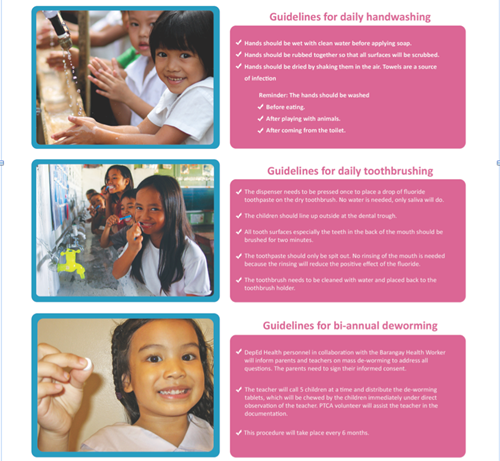Philippines - The Essential Health Care Package- “Fit for School” programme
Philippines - The Essential Health Care Package- “Fit for School” programme
By Monse B. and Stjernswärd J.
Introduction
Schoolchildren in the Philippines suffer from a high burden of preventable diseases due to personal hygiene deficiencies being a common cause. Among the main diseases are respiratory infections, diarrhoea and worm infections. The National Oral Health Survey from 2006 revealed that 97% of 6 year old children suffer from dental caries. Toothache is the most common reason for children missing days from school.
The Department of Education hence has developed the Essential Health Care Package (EHCP), an integrated school health programme, based on the principles of the Fit for School Action Framework.
Background
The programme uses simple, evidence-based interventions that can be delivered at low cost in elementary schools to address preventable diseases. Besides supervised handwashing with soap and bi-annual deworming it implements daily supervised toothbrushing with fluoride toothpaste.
The essence of the EHCP lies in the everyday routines of implementing the interventions in public elementary schools and day-care centres, including access to water, appropriate washing facilities and government funded soap, toothbrushes and toothpaste.
Integrating and institutionalising healthy habits into daily life at an early age, when children are most receptive, can establish healthy behaviour that lasts a lifetime and avoids the more complex challenges of health education and behaviour change among adolescents and adults.
Programme Outline
The “Fit for School” programme intervenes and prevents diseases among children by institutionalising healthy behaviours at school.
- Daily supervised hand washing with soap.
- Daily supervised toothbrushing with fluoridated toothpaste.
- De-worming children bi-annually by swallowing albendazole tablets.
The programme is implemented by the Education sector, while the finance and procurement of needed consumables like soap, toothpastes, toothbrushes and medication are provided by the Health sector.
Guidelines to washing hands, tooth brushing and de-worming are available. Parents, teachers, school principals and nurses participate in the Programme.
(Click picture for an enlarged view of above)
Outcome
The Department of Education has adopted EHCP as the national flagship program across the country from which more than two million children in 42 out of 80 provinces were benefitting in 2012.
Following interest from other countries in Southeast Asia, German Development Cooperation (GIZ) has established the Fit for School Regional Programme, in partnership with the Regional Center for Innovation of the Southeast Asian Ministers of Education Organization (SEAMEO INNOTECH). Started in late 2011, the three-year programme will provide capacity and technical assistance for school health on a regional level, with specific programming for schools in Cambodia, Indonesia and Lao PDR.
Conclusion
“Fit for School” programme is based on intervention aimed at common preventable diseases among children. This programme successfully implements behavioural changes among children that brings down the burden of diseases among children and adults.
References
1) Monse B, Naliponguit E, Belizario V, Benzian H, van Helderman WP. Essential health care package for children--the 'Fit for School' program in the Philippines. Int Dent J. 2010;60:85-93.
2) German Health Practice Collection:
http://german-practice-collection.org/en/successful-programmes/health/keeping-children-fit-for-school (short version)
http://german-practice-collection.org/en/successful-programmes/health/keeping-children-fit-for-school (long version)
3) The Fit for School health outcome study – a longitudinal survey to assess health impacts of an integrated school health programme in the Philippines:
http://www.biomedcentral.com/content/pdf/1471-2458-13-256.pdf
4) Philippine NGO Fit for School Inc.:
http://www.fitforschool.ph/

